This post will be a continuation of my exploration into the kinds of foreign movies that Seoul residents might have watched in 1943, when Imperial Japan was in the middle of a desperate war. To mark exactly 80 years since February and March 1943, I scanned the Keijo Nippo newspapers for any movie ads for foreign films that were showing at movie theaters in Seoul for those months. I identified the movies based on the Japanese titles as well as clues left in the ads themselves, such as the plot lines and the names of the directors and actors. As you can see, the vast majority of the foreign movies were produced in Germany, with just one French film that was not a German co-production. Kora Terry (1940), a German spy thriller, and Wunschkonzert (1940), a German propaganda musical, make their appearance again after being screened in January 1943.
Foreign movies shown in February 1943:
- Verklungene Melodie (Germany, 1938)
- Sieben Ohrfeigen (Germany, 1937)
- Manege (Germany, 1937)
- Kora Terry (Germany, 1940)
- L'Equipage (France, 1928)
Foreign movies shown in March 1943:
- Adrienne Lecouvreur (France/Germany, 1938)
- Heimat (Germany, 1938)
- Streit um den Knaben Jo (Germany, 1937)
- Kora Terry (Germany, 1940)
- Wunschkonzert (Germany, 1940)
Let's take a look at the foreign movies which were screened in February 1943:
Verklungene Melodie (Dead Melody) was a 1938 German romantic comedy starring Brigitte Horney and Willy Birgel, who are depicted in this movie ad. The movie was showing from February 1st to the 3rd. It was a double feature with the Japanese domestic film 新たなる幸福 which you had to watch if you wanted to watch the foreign film.
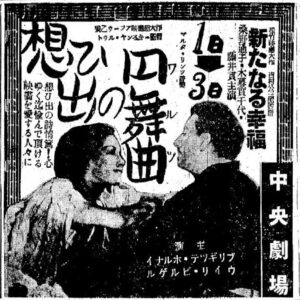
Sieben Ohrfeigen (Seven Slaps) was a 1937 German romantic comedy starring Lilian Harvey and Willy Fritsch, who are depicted in this movie ad. The movie was showing from February 4th to the 7th. It was a double feature with the Japanese domestic film 南進女性.
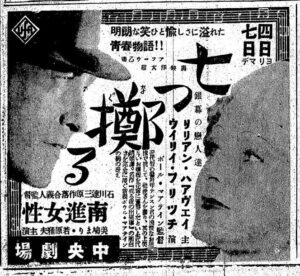
Kora Terry (1940) was a German spy thriller starring Marika Rökk (pictured in these ads) who is depicted in this ad. It screened in January 1943, and it continued to be screened into February and March. Unlike most of the other foreign films, it was screened as a standalone feature rather than as a double feature. Two German brochures for this movie are available on the Internet Archive here and here.
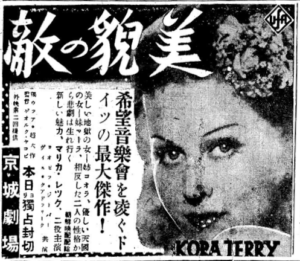
Manege was a 1937 German romantic comedy about a trapeze artist who tries to exact revenge on his cheating wife, starring Anneliese Uhlig and Albert Matterstock, who are depicted in this movie ad. It was a standalone feature which screened from February 11 to 13.
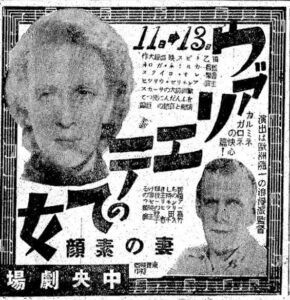
L'Equipage was a 1928 French aviation drama showing from February 2nd to the 4th. No foreign actors are depicted in the movie ad, and only some rough pictures of airplanes hint at the movie's content. It was a double feature with the Japanese domestic film 女学生記.
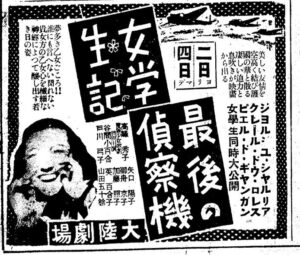
Let's take a look at the foreign movies which were screened in March 1943:
Adrienne Lecouvreur was a 1938 French-German historical romantic drama that had a French director, Marcel L'Herbier, and starred Yvonne Printemps and Pierre Fresnay, who are depicted in this movie ad. It was co-produced by France and Germany. This was a double feature with an Imperial Japanese war propaganda documentary, 戦線二万キロ, screened from March 9th to 11th to mark the March 10th anniversary of Imperial Japan's victory over Russia in the Russo-Japanese War of 1905.
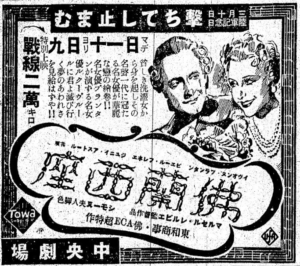
Heimat (Homeland) was a 1938 German historical drama film starring Zarah Leander, who is depicted in this movie ad. It was a double feature with an Imperial Japanese war documentary film 勝利の基礎, screened from March 14th to 16th.
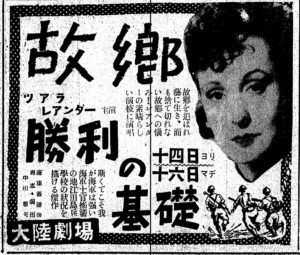
Streit um den Knaben Jo (Strife over the Boy Jo) was a 1937 German family comedy starring Lil Dagover, Mária Tasnádi Fekete, and child actor Klaus Detlef Sierck, who are depicted in this movie ad. This film screened as a standalone feature from March 1st to the 3rd. The full movie is available on Youtube with no subtitles (link).
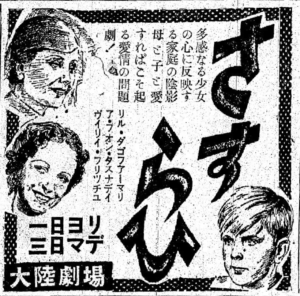
Wunschkonzert (1940) was a German drama propaganda film starring Ilse Werner, who is prominently featured on the ads. This movie was apparently heavily promoted in Keijo Nippo, since its ads come up the most frequently among the foreign films advertised on Keijo Nippo, and it screened at least in both January and March of 1943. It started screening again on March 17th, with no indication on when it will end screening. The German brochure for this movie is available on the Internet Archive here. The full movie (no subtitles) is available on the Internet Archive here. A clip of one of the songs is available on YouTube here.
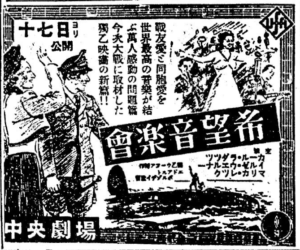
Kora Terry (Germany, 1940) continued to be shown in March 1943 as well, opening again on March 30th.
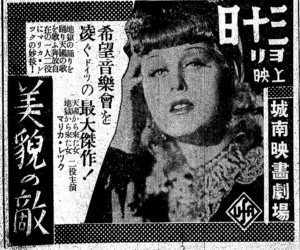
Source 1: https://www.archive.org/details/kjnp-1943-02-01
Source 2: https://www.archive.org/details/kjnp-1943-02-02
Source 3: https://www.archive.org/details/kjnp-1943-02-04
Source 4: https://www.archive.org/details/kjnp-1943-02-11
Source 5: https://www.archive.org/details/kjnp-1943-03-01
Source 6: https://www.archive.org/details/kjnp-1943-03-09
Source 7: https://www.archive.org/details/kjnp-1943-03-14
Source 8: https://www.archive.org/details/kjnp-1943-03-17
Source 9: https://www.archive.org/details/kjnp-1943-03-30




No comments:
Post a Comment